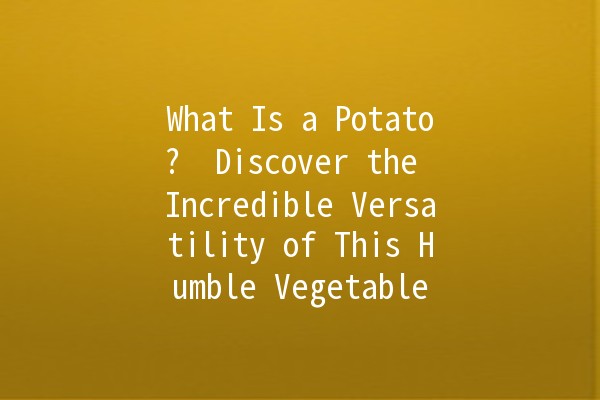Potatoes are one of the most widely consumed and versatile vegetables in the world. Originating in the Andean region of South America, this starchy tuber has traveled far and wide to become a staple in diets across the globe. In this article, we will explore the various aspects of potatoes, from their nutritional value to their many culinary applications, and share practical tips and tricks to get the most out of this incredible vegetable.
The Nutritional Powerhouse of Potatoes
A Rich Source of Essential Nutrients
Potatoes are often dismissed as mere comfort food, but they are actually a rich source of essential nutrients. One mediumsized potato (about 150 grams) contains approximately:
Calories: 130
Carbohydrates: 30 grams
Protein: 3 grams
Fat: 0 grams
Fiber: 2 grams

Vitamin C: 45% of the recommended daily value
Vitamin B6: 20% of the recommended daily value
Potassium: 10% of the recommended daily value
These nutrients play essential roles in promoting overall health, including supporting the immune system, regulating blood pressure, and maintaining healthy skin.
The Many Types of Potatoes
When it comes to potatoes, variety is the spice of life! Here are some of the most common types you'll find at your local grocery store:
Best known for their starchy texture, Russet potatoes are ideal for baking, frying, and making mashed potatoes. Their thick skin holds up well during cooking, resulting in a fluffy interior.
With their smooth, thin skin and waxy texture, red potatoes hold their shape well after cooking, making them perfect for salads, roasting, and steaming.
These potatoes have a buttery flavor and creamy texture, making them excellent for boiling, baking, and mashing. They are a favorite for many chefs due to their versatility.
Characterized by their unique shape, fingerling potatoes have a waxy texture and a rich flavor. They are often roasted or used in salads.
While not a true potato, sweet potatoes are often confused with them. They are sweeter and packed with betacarotene, making them a nutritious alternative for various dishes.
Tips for Enhancing Productivity with Potatoes
Potatoes can be a valuable addition to your kitchen routine. Here are five tips to enhance your productivity when cooking with potatoes:
Tip 1: Meal Prep with Mashed Potatoes
Description: Preparing a big batch of mashed potatoes ahead of time can save you time during busy weeks. You can store them in the refrigerator and reheat them as needed.
Application Example: Simply boil and mash a bunch of potatoes on the weekend, then portion them into containers for the week. Add butter, cream, or other favorite seasonings to elevate flavors.
Tip 2: Batch Cooking Baked Potatoes
Description: Baked potatoes are a great makeahead option. You can bake several potatoes at once and use them throughout the week for various meals.
Application Example: Preheat the oven and wrap potatoes in aluminum foil, then bake until tender. Top with sour cream, cheese, or your favorite toppings for quick meals.
Tip 3: Store Properly for Longevity
Description: Proper storage can extend the life of your potatoes. Keep them in a cool, dark place, away from onions and other vegetables to prevent sprouting.
Application Example: Use a cardboard box or a paper bag to keep potatoes in a wellventilated area. Avoid refrigeration, as the cold can convert starches into sugars.
Tip 4: Use Potato Skins Creatively
Description: Don’t waste potato skins! They are nutritious and can be transformed into crispy snacks.
Application Example: After baking potatoes, use the skins to make potato skin chips. Just season them with olive oil and spices, then bake until crispy.
Tip 5: Try Different Cooking Techniques
Description: Experimenting with various cooking techniques can bring new life to potatoes. Each method offers a different taste and texture.
Application Example: Try boiling, baking, roasting, or frying your potatoes. Each technique will produce different results that can enhance the meal at hand.
Frequently Asked Questions About Potatoes
Yes, potatoes are healthy when enjoyed in moderation. They are low in calories, rich in vitamins, and can be part of a balanced diet. Avoid frying them in oils or adding excessive butter to maintain their health benefits.
To cook potatoes perfectly, start by selecting the right type for your dish (e.g., starchy for baking, waxy for salads). Rinse, peel (if necessary), and cut them into evensized pieces. Boil in salted water until forktender, then drain and let them steam dry before further cooking.
Green spots on potatoes are a sign of solanine, a natural toxin. It’s best to peel the green areas or discard the potato entirely if it’s significantly green or sprouted. Always store potatoes properly to minimize greening.
Popular toppings for baked potatoes include sour cream, shredded cheese, bacon bits, chives, broccoli, and chili. Customize to your liking with fresh herbs or any of your favorite condiments.
A bad potato will have soft or mushy spots, significant sprouting, or a foul odor. If you notice any of these signs, it’s best to discard the potato to avoid food poisoning.
No, sweet potatoes and regular potatoes are distinct. Sweet potatoes are sweeter, have a different nutritional profile (higher in betacarotene), and come in various colors. Regular potatoes are starchy and are typically used in savory dishes.
By understanding the versatile nature of potatoes, you can unlock a world of culinary possibilities. From their nutritional benefits to practical cooking tips, potatoes are a staple that can enhance any meal. Happy cooking!